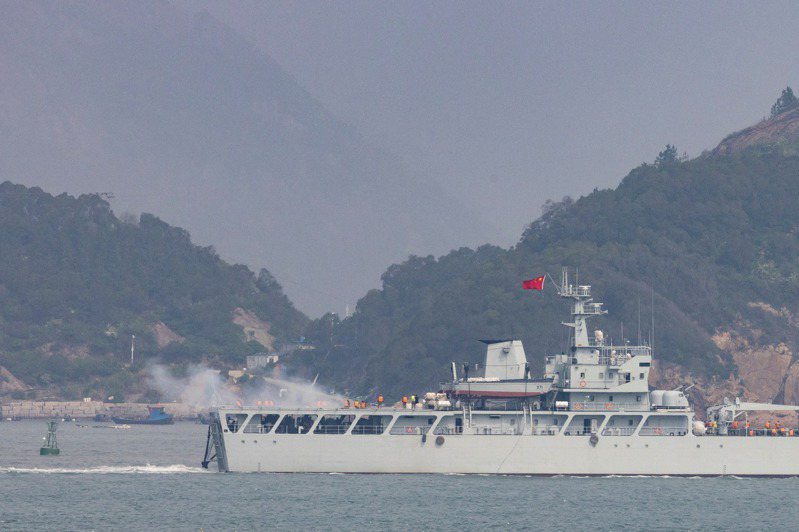In its latest report on China’s military power, the U.S. Department of Defense examined Beijing’s increased coercion against Taiwan through military exercises in recent years. The picture shows a Chinese warship conducting military exercises near Fuzhou. (Reuters)
USADepartment of DefenseCheck out the latest report on China’s military powerBeijingIn recent years, military exercises have been used to increase coercion against Taiwan, including simulated blockades and increasedPeople’s Liberation ArmyNumber of jamming stations, etc. The report also lists six scenarios that may prompt China to take military action against Taiwan.
The U.S. Department of Defense released the 2023 “Report on Military and Security Developments Involving the People’s Republic of China” on the 19th. The US “Newsweek” reported the next day that the report examined Beijing’s increased coercion against Taiwan in recent years, including military actions such as ballistic missiles flying over Taiwan.
Beijing regards Taiwan as one of its red lines, and the report lists six scenarios that may prompt China to take military action against Taiwan.
First, formally declare independence. “Newsweek” reported that Beijing has been saying for decades that it would launch a war against Taiwan if it declared legal independence. China passed the “Anti-Secession Law” in 2005 with the intention of opposing independence and promoting reunification.
Second, there is the undefined tendency of Taiwan independence. “Newsweek” analyzed that the Taiwan authorities deliberately avoided directly declaring independence, preferring to maintain the status quo. U.S. policy also prefers to maintain the ambiguity of the status quo. Since the United States severed diplomatic relations with Taipei in 1979 and established diplomatic relations with Beijing, Washington has made many commitments to both parties, including recognizing Beijing’s one-China position and ensuring that Taiwan has sufficient self-reliance. defense.
President Tsai Ing-wen also said in an interview with the British Broadcasting Corporation (BBC) in 2020 that there is no need for Taiwan to declare independence because “we are already an independent country.”
Third, Taiwan is experiencing internal turmoil. “Newsweek” pointed out that China has stated that if internal unrest occurs in Taiwan, it will use force to respond. Although Chinese leaders often refer to anti-unification political leaders and supporters as “separatist forces,” this of course also includes the majority of Taiwanese people. . After Taiwan embarked on the road to democratization in the late 1980s, the society as a whole has developed peacefully, and Taiwan is now one of the safest countries in the world.
Fourth, Taiwan acquires nuclear weapons. “Newsweek” analyzed that Taiwan currently does not have nuclear weapons, and there is no evidence that it will pursue nuclear weapons. After China acquired nuclear bombs, Taiwan secretly developed a nuclear weapons program in the 1960s. After it was discovered by the United States in the late 1980s, Taiwan was forced to give up its nuclear weapons.
Fifth, cross-Strait reunification dialogue will be postponed indefinitely. Chinese President Xi Jinping reiterated at the 20th National Congress of the Communist Party of China in October last year that cross-strait reunification is necessary and inevitable for the “great rejuvenation of the Chinese nation.” U.S. Secretary of State Antony Blinken later said that China has changed the status quo regarding the Taiwan Strait. “Determined to pursue faster reunification”.
An August survey by the Taiwan Public Opinion Education Foundation showed that only 11.8% of Taiwanese people support reunification with China, 48.9% support eventual legal independence, and 26.9% support maintaining the status quo. Maintaining the status quo is also the official position of the currently ruling Democratic Progressive Party and the main opposition Kuomintang.
Sixth, foreign troops intervene in Taiwan’s internal affairs. A white paper released by Taiwan’s Ministry of National Defense last year listed the stationing of foreign troops in Taiwan as one of the factors that may catalyze China’s invasion of Taiwan.
After the U.S. government approved $80 million in foreign military financing for Taiwan in August, China also issued a “stern warning” to separatists and foreign troops and held military exercises around Taiwan last month.
As PLA aircraft continue to disrupt Taiwan, the former US Indo-Pacific commander warned earlier this week that the US upgrades its naval and air force armaments to prepare for a possible war in the mid-2030s, but any conflict with China is likely to occur before then. break out.
Beijing Ministry of National Defense People’s Liberation Army
Previous article
The Trump campaign website still posted a post criticizing the New York court clerk and judge for imposing a $5,000 fine and severe fines for repeat violations.
#Department #Defense #report #analyzes #factors #lead #war #Taiwan #Strait #World #News #Network
2023-10-21 14:24:03


